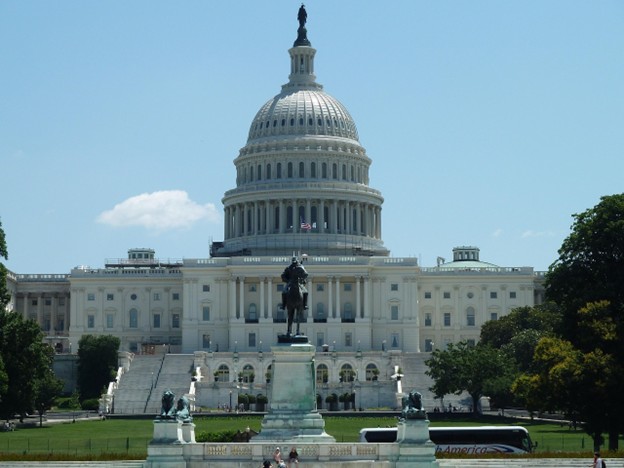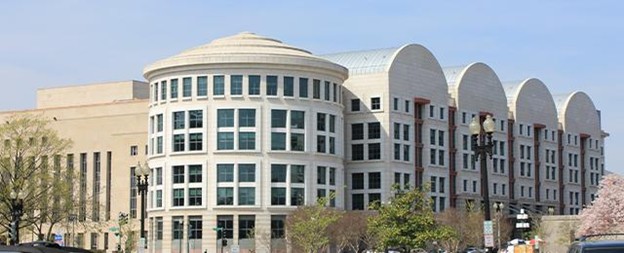In an effort to elicit sympathy for these “noncitizen Venezuelans,” their lawyers, members of the ACLU and Democracy Forward, state that “[t]hey have compelling asylum claims – for instance, one fled Venezuela after he was beaten by police because his stepfather was a political dissident…All deeply fear removal to a country where they risk persecution.”
In its order granting the Temporary Restraining Order, the Court stated that “an immediate Order is warranted to maintain the status quo until a hearing can be set.” The Court initially ordered that “Defendants shall not remove any of the individual Plaintiffs from the United States for 14 days absent further Order of the Court,” but then expanded its order to prevent the removal of “All noncitizens in U.S. custody who are subject to the March 15, 2025 Presidential Proclamation.”
Seems not everyone got the message from Judge Boasberg. A plane loaded with “noncitizen Venezuelans” landed in El Salvador after the judge’s order was issued. According to CBS News, “[s]ocial media posts from Salvadoran President Nayib Bukele indicated at least one flight carrying deported individuals had arrived in his country after the order. In one post, Bukele commented on a news story about the ruling by writing, ‘Oopsie… Too late.’ That post was shared by U.S. Secretary of State Marco Rubio and White House Communications Director Steven Cheung.”
Judges, whether federal or state, don’t like it when they think their orders are being violated, so the Court ordered an immediate hearing, and further ordered the government to provide a “sworn declaration that no one on any flight departing the United States after 7:25 p.m. on March 15, 2025, was removed solely on the basis of the Proclamation at issue; 2) A sworn declaration setting forth when the Proclamation at issue was signed, when it was made public, and when it went into effect; 3) The Government’s best estimate of the number of individuals subject to the Proclamation currently remaining in the United States and how many are currently in U.S. custody.”
In their response, the government asserted that it did not violate the Court’s order. “As to any flights that were already outside U.S. territory and airspace, anyone aboard had already been ‘removed’ within the meaning of the Alien Enemies Act and the Court’s order, and therefore were not covered by the order,” the Attorney General’s Office states. But more importantly, the Trump Administration challenges the Court’s Authority to issue an injunction in the first place. “Plaintiffs cannot use these proceedings to interfere with the President’s national-security and foreign-affairs authority, and the Court lacks jurisdiction to do so,” the Attorney General states.
“[E]ven if the Court’s order had purported to enjoin the government from taking steps overseas pursuant to the Proclamation,” the Attorney General states, “that still would not restrict the President from exercising his other authorities under the Constitution to engage in diplomatic negotiations and to protect the United States from dangerous terrorists and criminals already outside the country… just as a court assuredly could not enjoin the President from carrying out a foreign drone strike or an overseas military operation, or from negotiating with a foreign power to coordinate on such an operation, a court [cannot] lawfully restrict the President’s inherent…authority to work with a foreign nation to transfer terrorists and criminals who are already outside the United States.”
None of this makes any sense to the majority of Americans. Tren de Aragua is a demonstrably dangerous group of criminals, who came to national attention when they violently took over an apartment complex in Colorado. How can a federal judge order their removal halted?
As we discussed as far back as 2019, “for many years, it has been held repeatedly by the US Supreme Court that the power to issue injunctive relief extends to whoever is affected by the injunction, whereever they may be. For instance, in Steele v. Bulova Watch Co., a 1952 decision, the Supreme Court held that “the District Court in exercising its equity powers may command persons properly before it to cease or perform acts outside its territorial jurisdiction” (emphasis added)…Thus, there is no geographical limit to a Court’s exercise of its power to issue an injunction.”
Therefore, Judge Boasberg, who sits in District Court in Washington, DC, can issue an injunction that affects “noncitizen Venezuelans” who are being held in Texas. However, Judge Boasberg fails to acknowledge that his court cannot assert jurisdiction over a Presidential Proclamation which invokes the Alien Enemies Act.
There is specific case law on this issue. In Ludecke v. Watkins, a US Supreme Court decision from 1948, Justice Felix Frankfurter wrote that “some statutes ‘preclude judicial review’…Barring questions of interpretation and constitutionality…the Alien Enemy Act of 1798 is such a statute. Its terms, purpose, and construction leave no doubt… The very nature of the President’s power to order the removal of all enemy aliens rejects the notion that courts may pass judgment upon the exercise of his discretion.” (Citations omitted.)
In an effort to sidestep this clear interpretation of the law, the lawyers for Tren de Aragua argue that, “[t]he President has invoked…a war power, the Alien Enemies Act of 1798 (“AEA”), in an attempt to summarily remove noncitizens from the United States and bypass the immigration laws Congress has enacted…[b]ut the United States is not at war, and the prerequisites for invocation of the AEA have not been met…[t]he President can invoke the AEA only in a state of ‘declared war,’ or when an ‘invasion or predatory incursion is perpetrated, attempted, or threatened against the territory of the United States by any foreign nation or government’…[n]ot surprisingly, therefore, the Act has been invoked only three times in our country’s history, all in declared wars: The War of 1812, World War I, and World War II.”
“The President’s imminent Proclamation targets Venezuelan noncitizens whom the government accuses of being part of Tren de Aragua, a criminal gang,” the lawyers continue. “But the President’s Proclamation is invalid under the AEA for two plain reasons. First, Tren de Aragua is not a ‘foreign nation or government.’ Second, Tren de Aragua is not engaged in an ‘invasion’ or ‘predatory incursions’ within the meaning of the AEA, because criminal activity does not meet the longstanding definitions of those statutory requirements.”
These arguments take an extremely narrow view of the powers invoked by President Trump in his Proclamation.
Turning once more to the case of Ludecke v. Watkins, a German National had objected to his removal from the United States and argued that World War II had ended, so the Alien Enemies Act no longer applied. However, the Court stated that “[w]ar does not cease with a cease-fire order, and power to be exercised by the President such as that conferred by the Act of 1798 is a process which begins when war is declared but is not exhausted when the shooting stops… It is not for us to question a belief by the President that enemy aliens who were justifiably deemed fit subjects for internment during active hostilities do not lose their potency for mischief during the period of confusion and conflict which is characteristic of a state of war even when the guns are silent but the peace of Peace has not come…[t]hese are matters of political judgment for which judges have neither technical competence nor official responsibility.” (Emphasis added, Citations omitted.)
Further, as noted in the Proclamation itself, Tren de Aragua is not just a “criminal organization.” “TdA is closely aligned with, and indeed has infiltrated, the Maduro regime, including its military and law enforcement apparatus,” the Proclamation states. “TdA grew significantly while Tareck El Aissami served as governor of Aragua between 2012 and 2017. In 2017, El Aissami was appointed as Vice President of Venezuela. Soon thereafter, the United States Department of the Treasury designated El Aissami as a Specially Designated Narcotics Trafficker…Like El Aissami, Nicolas Maduro, who claims to act as Venezuela’s President and asserts control over the security forces and other authorities in Venezuela, also maintains close ties to regime-sponsored narco-terrorists. Maduro leads the regime-sponsored enterprise Cártel de los Soles, which coordinates with and relies on TdA and other organizations to carry out its objective of using illegal narcotics as a weapon to “flood” the United States. In 2020, Maduro and other regime members were charged with narcoterrorism and other crimes in connection with this plot against America.”
The Proclamation also asserts that “[o]ver the years, Venezuelan national and local authorities have ceded ever-greater control over their territories to transnational criminal organizations, including TdA. The result is a hybrid criminal state that is perpetrating an invasion of and predatory incursion into the United States, and which poses a substantial danger to the United States.”
Based upon this relationship between Tren de Aragua and the Venezuelan government, President Trump finds that “TdA is perpetrating, attempting, and threatening an invasion or predatory incursion against the territory of the United States. TdA is undertaking hostile actions and conducting irregular warfare against the territory of the United States both directly and at the direction, clandestine or otherwise, of the Maduro regime in Venezuela.”
This language would satisfy the requirements for invocation of the Alien Enemies Act, which does not require a declaration of war, but “any invasion or predatory Incursion,” which is “perpetrated, attempted or threatened against the territory of the United States by any foreign nation or government.”
In other words, President Trump has proclaimed that Tren de Aragua is acting at the behest of the Venezuelan government to perpetrate an invasion of the United States, in an effort to destabilize our country. Using this specific language, and relying upon the precedent of Ludecke v. Watkins, it should be crystal clear that the Courts have no jurisdiction in this matter.
How then can a federal judge interfere in this exercise of Presidential power? The short answer is; He can’t. As the Attorney General states, “[t]he Executive Branch has designated TdA a foreign terrorist organization, a designation that Plaintiffs do not challenge. The course of these proceedings – in which the Court has enjoined removal of aliens whom the Executive Branch has determined are part of a foreign terrorist organization – raises extraordinary concerns about the rule of law and the Executive Branch’s ability to take swift actions to keep the Nation safe.”
Let us hope the Appellate Courts step in swiftly to reverse Judge Boasberg’s blatant and illegal judicial activism.
Judge Wilson served on the bench in NYC
Illustration: Pixabay









